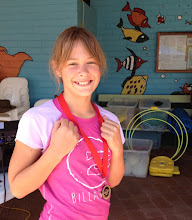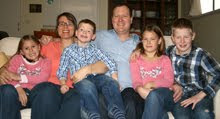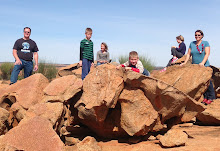We've finally finished reading the Borrowers books by Mary Norton, taking four months to read 700+ pages of very small text, loving every night of reading aloud. Now I just need to work out what to read next! Any suggestions?
Sunday 29 April 2012
Tuesday 17 April 2012
Tertullian wrote:
"We, little fishes, after the example of our ikthus Jesus Christ, are born in water."
On Baptism ch. I
(My favourite quote from my research on baptism for Church HIstory.)
Sunday 15 April 2012
My Baptism
Jeff: Welcome and prayer
Bible readings
Shelley: Matthew 28:18-20
Then Jesus came to them and said, “All authority in heaven and on earth has been given to me. Therefore go and make disciples of all nations, baptising them in the name of the Father and of the Son and of the Holy Spirit, and teaching them to obey everything I have commanded you. And surely I am with you always, to the very end of the age.”
Acts 2:36-41a
Joshua: “Therefore let all Israel be assured of this: God has made this Jesus, whom you crucified, both Lord and Messiah.”
Anna: When the people heard this, they were cut to the heart and said to Peter and the other apostles,
Abigail & Samuel: “Brothers, what shall we do?”
Anna: Peter replied,
Joshua: “Repent and be baptised, every one of you, in the name of Jesus Christ for the forgiveness of your sins. And you will receive the gift of the Holy Spirit. The promise is for you and your children and for all who are far off—for all whom the Lord our God will call.”
Anna: With many other words he warned them; and he pleaded with them,
Joshua: “Save yourselves from this corrupt generation.”
Anna: Those who accepted his message were baptised.
Shelley: Ephesians 1:3-14
Praise be to the God and Father of our Lord Jesus Christ, who has blessed us in the heavenly realms with every spiritual blessing in Christ. For he chose us in him before the creation of the world to be holy and blameless in his sight. In love he predestined us for adoption to sonship through Jesus Christ, in accordance with his pleasure and will— to the praise of his glorious grace, which he has freely given us in the One he loves. In him we have redemption through his blood, the forgiveness of sins, in accordance with the riches of God’s grace that he lavished on us. With all wisdom and understanding, he made known to us the mystery of his will according to his good pleasure, which he purposed in Christ, to be put into effect when the times reach their fulfillment—to bring unity to all things in heaven and on earth under Christ.
In him we were also chosen, having been predestined according to the plan of him who works out everything in conformity with the purpose of his will, in order that we, who were the first to put our hope in Christ, might be for the praise of his glory. And you also were included in Christ when you heard the message of truth, the gospel of your salvation. When you believed, you were marked in him with a seal, the promised Holy Spirit, who is a deposit guaranteeing our inheritance until the redemption of those who are God’s possession—to the praise of his glory.
Sharon: Why I am being baptised
Apostles’ Creed
I believe in God, the Father Almighty,
Creator of heaven and earth.
I believe in Jesus Christ, his only Son, our Lord,
who was conceived by the Holy Spirit,
born of the virgin Mary,
suffered under Pontius Pilate,
was crucified, died and was buried;
he descended to the grave.
On the third day he rose again;
he ascended into heaven,
he is seated at the right hand of the Father,
and he will come again to judge
the living and the dead.
I believe in the Holy Spirit,
the holy catholic Church,
the communion of saints,
the forgiveness of sins,
the resurrection of the body,
and the life everlasting. Amen.
Pastor John Campbell: On Baptism
Amazing Grace
[John Newton]
Amazing grace - how sweet the sound
That saved a wretch like me.
I once was lost, but now I’m found
Was blind, but now I see.
’Twas Grace that taught my heart to fear
And Grace my fears relieved
How precious did that Grace appear
The hour I first believed
Through many dangers, toils and snares
I have already come;
'Tis Grace that brought me safe thus far
and Grace will lead me home.
Baptismal confession
Triple immersion into the name of the Father, of the Son and of the Holy Spirit


What the Lord has done in me
[Hillsongs]
Let the weak say, “I am strong”
Let the poor say, “I am rich”
Let the blind say, “I can see,
It’s what the Lord has done in me.”
Let the weak say, “I am strong”
Let the poor say, “I am rich”
Let the blind say, “I can see,
It’s what the Lord has done in me.”
Hosanna, hosanna
To the Lamb that was slain
Hosanna, hosanna
Jesus died and rose again
Into the river I will wade
There my sins are washed away
From the heavens, mercy streams
Of the Saviour’s love for me.
I will rise from waters deep
Into the saving arms of God
I will sing salvation songs
Jesus Christ has set me free.
Hosanna, hosanna
To the Lamb that was slain
Hosanna, hosanna
Jesus died and rose again
Let the weak say, “I am strong”
Let the poor say, “I am rich”
Let the blind say, “I can see,
It’s what the Lord has done in me.”
Prayer
Afternoon tea
Why I was baptised today
This is the short talk I gave at my baptism celebration this afternoon: I think of baptism as a bit like a formal, public, citizenship ceremony. At an Australian citizenship ceremony, people officially become Australian citizens. At a baptism, the person is officially recognised as a member of God’s church, a citizen of the kingdom of God. It’s possible, of course, to be a Christian who is a sort of permanent resident of God’s church, without any formal recognition of citizenship. But I want to be an active, loving and serving member of God’s church, so I’ve asked to be baptised. I’ve chosen to be baptised by full immersion, according to the rites of the Baptist Church, which I believe reflect well the original New Testament practice of baptism of new Christians.
I think of baptism as a bit like a formal, public, citizenship ceremony. At an Australian citizenship ceremony, people officially become Australian citizens. At a baptism, the person is officially recognised as a member of God’s church, a citizen of the kingdom of God. It’s possible, of course, to be a Christian who is a sort of permanent resident of God’s church, without any formal recognition of citizenship. But I want to be an active, loving and serving member of God’s church, so I’ve asked to be baptised. I’ve chosen to be baptised by full immersion, according to the rites of the Baptist Church, which I believe reflect well the original New Testament practice of baptism of new Christians.
Hopefully, it won’t surprise most of you to hear that I am not a new Christian. I became a Christian on Ash Wednesday, the 28th of February, in 2001, in the middle of an Alpha course. So you might wonder why it has taken me over a decade to decide to be baptised.
Well, I was baptised – by sprinkling of water according to the rites of the Uniting Church – at the age of 12. But at that time I wasn’t a real Christian. It was sort of like being made a citizen of a country that I hadn’t even visited (though I knew people who lived there).
I wasn’t a Christian because I didn’t understand what it meant to be saved by Jesus. I understood that I should obey God. But despite attending classes with the minister, I didn’t really understand that when Jesus died on the cross, he – Jesus – took the punishment for my sins completely. Because of what Jesus did, his righteous and goodness became mine. So I didn’t have to win God’s approval by my good behaviour. I just had to allow myself to be saved!
Baptism is, of course, a public recognition of trusting in Jesus Christ as one’s Saviour. So my baptism at the age of 12 was essentially worthless. But when I became a new Christian, I didn’t understand that. I was new to Christianity and I had a lot to learn about what it meant to be a Christian. Recently, I’ve been reading and studying about baptism, and I’ve seen friends get baptised as new Christians, and I’ve been challenged to rethink the idea of my own baptism. Today, as I’m baptised, I am announcing to you that I really do trust in the power of Jesus’ death and resurrection to save me from the consequences of my sins, so I can have eternal life in joyful fellowship with the LORD God.
The Apostles’ Creed sums up what I believe about God. It has been recited at baptisms since the earliest times, and I am going to repeat it today. If you are a Christian, you might like to say it with me now.
I believe in God, the Father Almighty,
Creator of heaven and earth.
I believe in Jesus Christ, his only Son, our Lord,
who was conceived by the Holy Spirit,
born of the virgin Mary,
suffered under Pontius Pilate,
was crucified, died and was buried;
he descended to the grave.
On the third day he rose again;
he ascended into heaven,
he is seated at the right hand of the Father,
and he will come again to judge
the living and the dead.
I believe in the Holy Spirit,
the holy catholic Church,
the communion of saints,
the forgiveness of sins,
the resurrection of the body,
and the life everlasting. Amen.
I am truly grateful to God for choosing me (as Shelley read from Ephesians 1) to be pure and blameless in his sight. As I am baptised in this water today, it will be a symbol of the washing that I have already received, when God washed away my sins and made me a new creation, righteous in God’s eyes.
So these are the three reasons that I am being baptised today:
Because I want to be publicly recognised as a faithful citizen of the kingdom of God;
So I can make a public announcement to you that I do place my faith and trust in the saving power of Jesus Christ, through which my sins have been forgiven and my eternal life with God the Father has been guaranteed;
And as a public sign that my sins have been washed away by the act of Jesus’ death, and now I am a cleansed, purified, new creation who has been made righteous in God’s sight.
Thankyou, my friends, for coming to bear witness to this public testimony of my faith in Jesus.
Friday 13 April 2012
What does baptism mean?
Being baptised is, in a sense, being made - officially - a Christian. It's the rite of initiation which grants membership to the church. Some early Christian writers saw it as granting entrance not just to a particular church, but actually granting citizenship to the kingdom of God. So you might think of baptism being a Christian citizenship ceremony, which makes official what is recognised: that the person's allegiance is now to God through his Son, Jesus Christ. Just as a person could be a permanent resident of Australia without being a citizen, it is possible to be a Christian without being baptised. But just as citizenship confers particular benefits and responsibilities (voting, jury duty), baptism confers the benefits of being publicly recognised as a Christian.
Baptism has a whole lot of other, deeper, meanings as well. It is a sign that the person is linking themselves to the death, burial and resurrection of Jesus. They are "dying" to a lifetime of sin and selfishness, and being "resurrected" to a life of love of God and service for him, an act which is only possible because of Jesus' death and resurrection. Another way of looking at baptism is to think of it being a bath, but not one that washes off dirt: instead, baptism symbolically washes away the person's sins. In the early church, the time of baptism was seen as the time when a person received the Holy Spirit. From then on, God's Spirit lived in the baptised person, protecting them from evil and guiding them to live rightly. The baptism was seen to be granting "enlightenment" because once the Holy Spirit was living in a person, he would give them understanding and wisdom that an unbaptised person would not have. Baptism was also described as "dyeing" because the person was completely changed - made new - by the process of being wet, just as a piece of cloth wet in dye is completely different when it comes out from the dye.
In my case, I am being baptised by a retired pastor of the Baptist denomination, in accordance with the rites of the Baptist group of churches. Some denominations recognise other's baptisms, and some do not. For example, I don't think the Catholic Church recognises any other denomination's baptismal rites as being meaningful (or at least they didn't until very recently). However, a Baptist baptism would be recognised by the Anglican or Uniting denominations.
Some denominations insist that a proper baptism occurs a certain way. For example, many Open/Christian Brethren and Baptist churches would only allow membership to people baptised by immersion (that is, one's entire body gets wet in the process), unless some sort of sickness prevents the person from getting well and truly dunked. This insistence is partly because these churches believe that immersion was the original way that baptism was done. It is also because of the symbolism involved in identifying with Jesus' death (when one goes completely under the water) and new life (when one is then brought up out of the water). The apostle Paul wrote about this in his letter to the Romans:
"Or don't you know that all of us who were baptised into Christ Jesus were baptised into his death? We were therefore buried with him through baptism into death in order that, just as Christ was raised from the dead through the glory of the Father, we too may live a new life.
For if we have been united with him in a death like his, we will certainly also be united with him in a resurrection like his. For we know that our old self was crucified with him so that the body ruled by sin might be done away with, that we should no longer be slaves to sin - because anyone who has died has been set free from sin."
The Anglicans and Presbyterians generally baptise by sprinkling or pouring water over the person, rather than by immersion, and I have seen both done in Uniting churches. In my case, the baptism I had (by sprinkling) in the Uniting church would not be considered enough to allow my membership in most Baptist churches - which could be a problem if Jeff wants to be employed as their pastor!
Many immersion-only churches also generally insist on baptism only being performed on people who actively profess to believe in salvation through Jesus Christ, rather than (as for the Anglicans, Catholics and Presbyterians, for example) allowing the baptism of infants, who are usually babies of Christian parents. I wasn't a real believer at the time of my baptism, which to my mind makes that baptism worthless. If you think about my citizenship analogy, my baptism was kind of like someone else making me a citizen of a country that (at that time) I'd never been to and had no real interest in.
On Sunday, I am going to be baptised by immersion in the Swan River. Jeff and John will pray for me and my friend Shelley and my kids will read some passages about baptism from the Bible. I'll "make my confession" (give a short talk on why I am being baptised). I will also recite the Apostles' Creed, a simple outline of what I believe as a Christian, which was first used during early Christian baptisms in a question and answer format. Once in the water, I will kneel down and John will bow my head forward into the waters three times (symbolic of the three persons of the Godhead; Father, Son and Holy Spirit). We'll also sing two songs, "Amazing Grace" and "It's what the Lord has done in me". I happen to be doing a research paper on baptism in the first three centuries AD at the moment for college so the liturgy (procedure) for my baptism is somewhat influenced by early baptismal practices!








